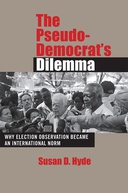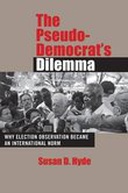Explore
Cowinner of the International Studies Association’s Chadwick F. Alger Prize, Winner of the American Political Science Association’s Comparative Democratization Section Best Book Award, and Cowinner of the Yale University MacMillan Center’s Gustav Ranis International Book Prize.Why did election monitoring become an international norm? Why do "pseudo-democrats" (undemocratic leaders who present themselves as democratic) invite international observers, even when they are likely to be caught manipulating elections? Is election observation an effective tool of democracy promotion, or is it simply a way to legitimize electoral autocracies? This book uses cross-national data on election observations since 1960 and case studies of Armenia, Indonesia, Haiti, Peru, Togo, and Zimbabwe to explain international election monitoring with a new theory of international norms.
This book is included in DOAB.
Why read this book? Have your say.
You must be logged in to comment.
Rights Information
Are you the author or publisher of this work? If so, you can claim it as yours by registering as an Unglue.it rights holder.Downloads
This work has been downloaded 1406 times via unglue.it ebook links.
- 124 - pdf (CC BY-NC-ND) at OAPEN Library.
- 262 - mobi (CC BY-NC-ND) at Unglue.it.
- 484 - pdf (CC BY-NC-ND) at Unglue.it.
- 366 - epub (CC BY-NC-ND) at Unglue.it.
Keywords
- Armenia
- Corrupt practices
- democracy promotion
- Democratization
- Election
- Election monitoring
- Elections
- Electoral fraud
- Haiti
- Indonesia
- International relations
- KUnlatched
- Peru
- Political Science
- Political Science / Political Ideologies / Democracy
- Political structure & processes
- Political structures: democracy
- Politics & government
- Polling place
- Society & Social Sciences
- thema EDItEUR::J Society and Social Sciences::JP Politics and government::JPH Political structure and processes::JPHV Political structures: democracy
- Togo
- Zimbabwe
Links
DOI: 10.7591/cornell/9780801449666.001.0001Editions



